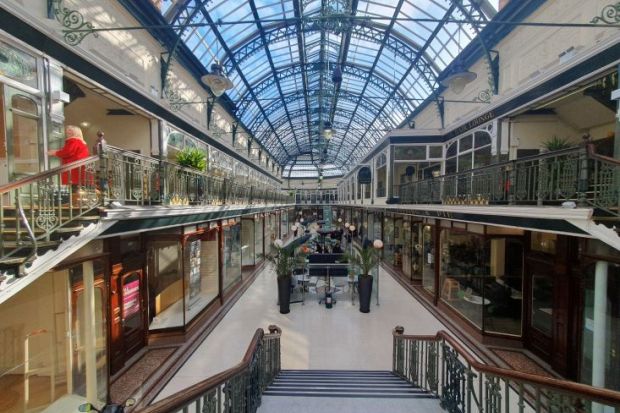“Nomadic” academics can bring some of the benefits of universities to “left behind” towns, according to one of the founders of a co-working project soon to launch in an old UK shopping centre.
After some false starts, Eric Lybeck, a lecturer in the University of Manchester’s Institute of Education, is set to launch the first iteration of a WeWork-style hub, now called the Engine Room, in Southport, envisaged as a place where academics who live far away from campuses can work alongside colleagues at other universities.
Southport was chosen as a site for the project, according to Dr Lybeck, because it is a “dormitory town” that is looking to diversify its economy away from seasonal seaside tourism and is nestled in between several major universities in north-west England.
The space occupies one of several empty units in the Victorian Wayfarers Arcade – a Grade II-listed building off the town’s main thoroughfare, Lord Street.
It will eventually offer bookable desks, meeting rooms and audiovisual studios for academics who increasingly work away from campuses post-pandemic. Its remit also been expanded to cater for those who work in the creative industries and other businesses as well.
“Creating an infrastructure for academics to live and work in these places is a means of replicating some of the cultural capital that cities that have a university often take for granted,” Dr Lybeck said.
With the rise of working from home, more people are being incentivised by the low cost of living to move to areas that would once have required long commutes into major cities for work, Dr Lybeck said. But once there, many find a lack of infrastructure.
He saw the project as having the potential to create a long-term base where academics could co-develop research with local people who, in turn, would start to see the benefits of academia.
“Academics are increasingly looked on with scepticism by people who have been ‘left behind’,” he said. “This could be a way to change that.”
The arcade still functions as a shopping centre, but most of its units are vacant. Dr Lybeck said it would likely eventually close and fall into disrepair without new ideas.
He hopes to have the first room of the project open this month, and to kick off an events programme soon.
The hub was originally set to open in Liverpool, but a lease fell through and Dr Lybeck said funding had been hard to come by.
Part of the problem, he said, has been a lack of available sources of money for non-science-based spin-offs and universities’ unwillingness to offer academics time in their schedules to work on social enterprise-style projects, which would allow them to “test theory by actually doing things”.
Register to continue
Why register?
- Registration is free and only takes a moment
- Once registered, you can read 3 articles a month
- Sign up for our newsletter
Subscribe
Or subscribe for unlimited access to:
- Unlimited access to news, views, insights & reviews
- Digital editions
- Digital access to THE’s university and college rankings analysis
Already registered or a current subscriber? Login








